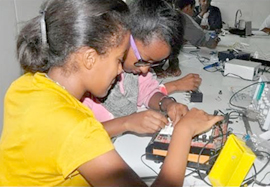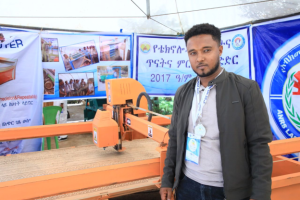
Psychologists suggest that children’s mind can easily acquire knowledge. This would usher us in the path of Lockean buzzword, tabula raza, which compares children’s mind with white paper.
Children living in urban areas of the developing world like, Africa, have exposure to the digital world— which has brought both opportunities and constraints to this part of the globe.
Underage children, if unchecked, waste their time on digital world, at the expense of their social and cognitive development. Primary schools seem to have ignored their roles in shaping kids in both online and offline use of digital technology.
In the case of Ethiopia, the issue is ignored in the curriculum hence children are far from developing skills at an early level.
STEM power, an international NGO registered in the USA is said to have mainly focuses in promoting and facilitating hands-on STEM (Science, Technology, Engineering and Mathematics) education across Ethiopia, an effort that may help the generation to shake hands with the future by emulating the best out of the digital world. It signed Memorandum of Understanding (MOU) with seven Universities. At the event, Prof. Hirut W/Mariam,
Minister of Science and Higher Education (MoSHE), stressed that universities are vested with responsibilities of cultivating children’s skills of innovation. Hence, such cooperation helps higher education institution to expand their capacity. Children can get measured exposure with technology. Put it another way, children can use technology for the good of the society. STEM power president Kidist Gebreamlak, explaining about the benefits, said their intervention make technology accessible in all areas of the country.
“The project intends to foster coordination between universities and surrounding communities on building youth’s innovative skills.” Selected primary school students will get opportunities to access labs including IT and other science equipment.
As MoSHE State Minister Prof. Afework Kasu, indicated this is one mechanism to bridge technological constraints. Students, particularly during their long vaccination of Ethiopian major rainy season can utilize their time efficiently in the STEM centers, Bahir Dar University President Dr. Frew Tegegne noted.
As a research conducted last year by Ministry of Education indicated, despite some promising opportunities, technological use in primary schools of Ethiopia face challenges of low quality education and budgetary constraints.
The study revealed that primary schools lack educational facilities which in turn affect students to link their studies with relevant technological outputs. On the other hand, Ministry of Education has designed new education roadmap which aims, among others, to enhance science and mathematics so as to create productive citizens, its implementation is expected to inspire youths’ technology use and innovation.
Herald March 22/2019
BY YESUF ENDRIS





